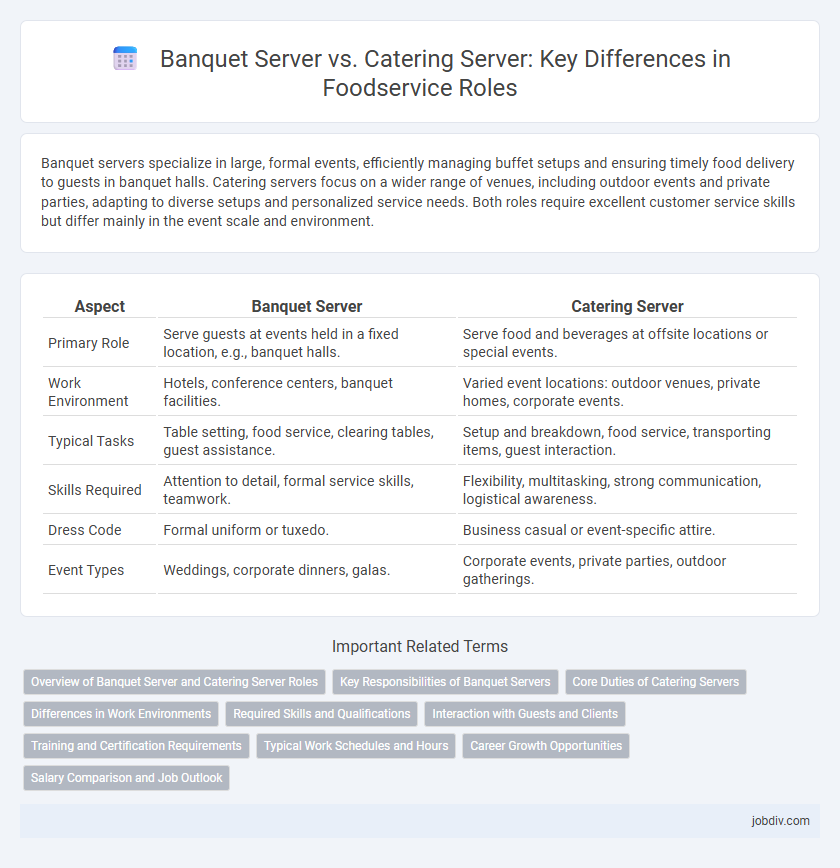Banquet servers specialize in large, formal events, efficiently managing buffet setups and ensuring timely food delivery to guests in banquet halls. Catering servers focus on a wider range of venues, including outdoor events and private parties, adapting to diverse setups and personalized service needs. Both roles require excellent customer service skills but differ mainly in the event scale and environment.
Table of Comparison
| Aspect | Banquet Server | Catering Server |
|---|---|---|
| Primary Role | Serve guests at events held in a fixed location, e.g., banquet halls. | Serve food and beverages at offsite locations or special events. |
| Work Environment | Hotels, conference centers, banquet facilities. | Varied event locations: outdoor venues, private homes, corporate events. |
| Typical Tasks | Table setting, food service, clearing tables, guest assistance. | Setup and breakdown, food service, transporting items, guest interaction. |
| Skills Required | Attention to detail, formal service skills, teamwork. | Flexibility, multitasking, strong communication, logistical awareness. |
| Dress Code | Formal uniform or tuxedo. | Business casual or event-specific attire. |
| Event Types | Weddings, corporate dinners, galas. | Corporate events, private parties, outdoor gatherings. |
Overview of Banquet Server and Catering Server Roles
Banquet servers specialize in managing food and beverage service during large, formal events such as weddings and corporate functions, ensuring timely and coordinated meal delivery. Catering servers handle food presentation and service across various venues, including off-site locations, with a focus on flexibility and adaptability to diverse event settings. Both roles require strong customer service skills, attention to detail, and the ability to work efficiently under pressure.
Key Responsibilities of Banquet Servers
Banquet servers specialize in managing large-scale events, ensuring timely setup, food service, and cleanup while maintaining strict adherence to event schedules and client specifications. Their key responsibilities include coordinating with the kitchen staff to serve multi-course meals efficiently, attending to guest needs throughout the event, and maintaining formal presentation standards. Unlike catering servers, banquet servers often work within dedicated banquet facilities and handle plated service for weddings, corporate functions, and galas.
Core Duties of Catering Servers
Catering servers primarily focus on setting up food stations, delivering plated meals, and ensuring seamless service at off-site events such as weddings and corporate functions. Their core duties include coordinating with event planners, handling buffet arrangements, and managing timely meal service to uphold food quality and guest satisfaction. Unlike banquet servers who operate within fixed venues, catering servers adapt to diverse locations and event formats to provide flexible, high-quality hospitality solutions.
Differences in Work Environments
Banquet servers primarily operate in formal event settings such as weddings, corporate galas, and large-scale celebrations, often working in ballrooms or banquet halls with fixed seating arrangements. Catering servers typically function in more variable environments including outdoor venues, corporate offices, and private residences, where they must adapt to diverse setups and meal service styles. The banquet server role involves consistent collaboration with event planners and strict adherence to event timelines, whereas catering servers require flexibility to manage unpredictable conditions and client-specific requests.
Required Skills and Qualifications
Banquet servers require strong multitasking abilities, excellent communication skills, and experience in formal table settings to manage large group events efficiently. Catering servers must possess flexibility, attention to detail, and knowledge of food safety protocols to adapt quickly to various venues and event types. Both roles demand physical stamina, customer service expertise, and the ability to work collaboratively in fast-paced environments.
Interaction with Guests and Clients
Banquet servers typically interact with large groups at formal events, providing coordinated service that emphasizes timing and presentation, while catering servers often engage more directly with individual guests to accommodate personalized orders and requests. Banquet servers manage guest flow and table setups in a fixed venue, facilitating smooth event progression, whereas catering servers adapt to diverse environments, ensuring client satisfaction through flexible interaction. Both roles require strong communication skills, but catering servers focus more on personalized client relationships and immediate guest needs.
Training and Certification Requirements
Banquet servers typically require specialized training in table settings, formal service techniques, and event-specific protocols to efficiently manage large-scale gatherings. Catering servers must be proficient in mobile food service, handling varied menu items, and compliance with health and safety certifications such as ServSafe or equivalent food handler permits. Both roles benefit from customer service training, but banquet server certification often emphasizes knowledge in banquet-style service standards and coordination with event staff.
Typical Work Schedules and Hours
Banquet servers typically work during scheduled events, which often occur evenings and weekends, with shifts lasting 4 to 8 hours depending on the size and timing of the function. Catering servers may experience more variable hours, including early mornings, late nights, and weekends, as they handle off-site events requiring setup and breakdown in addition to serving. Both roles demand flexibility, but banquet servers usually have more predictable schedules compared to the dynamic and travel-oriented nature of catering positions.
Career Growth Opportunities
Banquet servers often find career growth opportunities within large hotels and event venues, advancing to supervisory roles managing formal events and large-scale functions. Catering servers typically gain experience in diverse environments like corporate events and private parties, opening paths to roles in event coordination and client management. Both positions offer valuable skills in hospitality, communication, and logistics that support progression into restaurant management and event planning careers.
Salary Comparison and Job Outlook
Banquet servers typically earn an average hourly wage of $12 to $16, while catering servers' pay ranges from $11 to $15 per hour, with variations depending on location and experience. The job outlook for banquet servers shows steady demand in hotels and event venues, driven by the hospitality industry's growth, whereas catering servers benefit from expanding corporate and private event sectors. Both roles offer opportunities for tips, which can significantly augment overall earnings, but banquet servers often enjoy more consistent work schedules.
Banquet Server vs Catering Server Infographic

 jobdiv.com
jobdiv.com